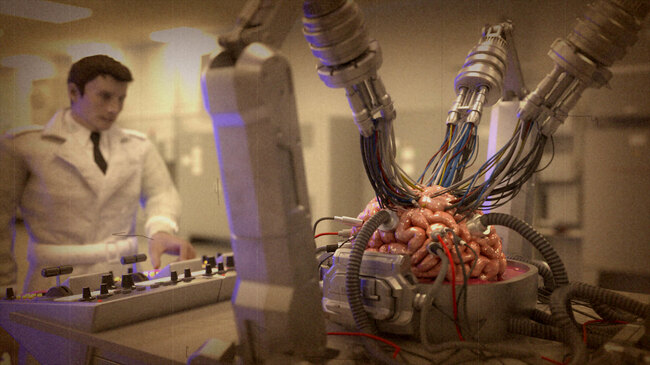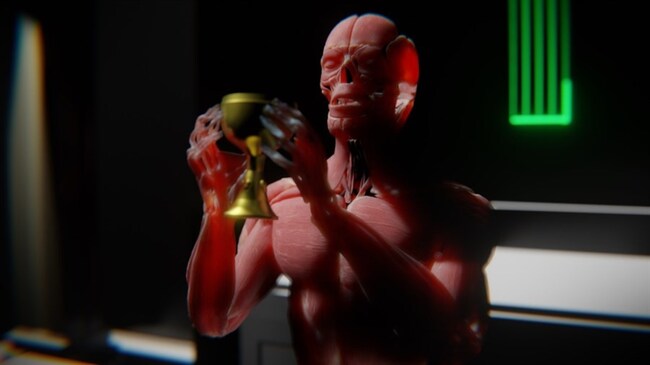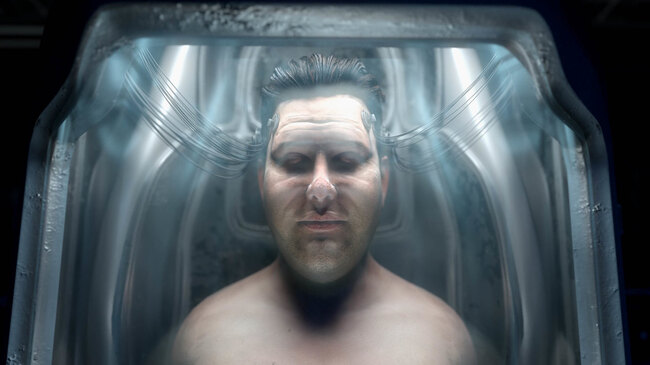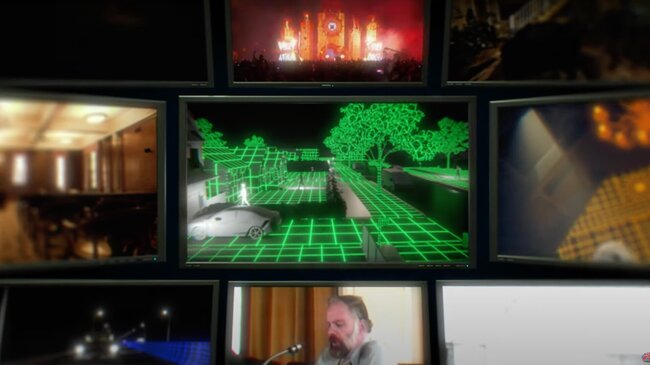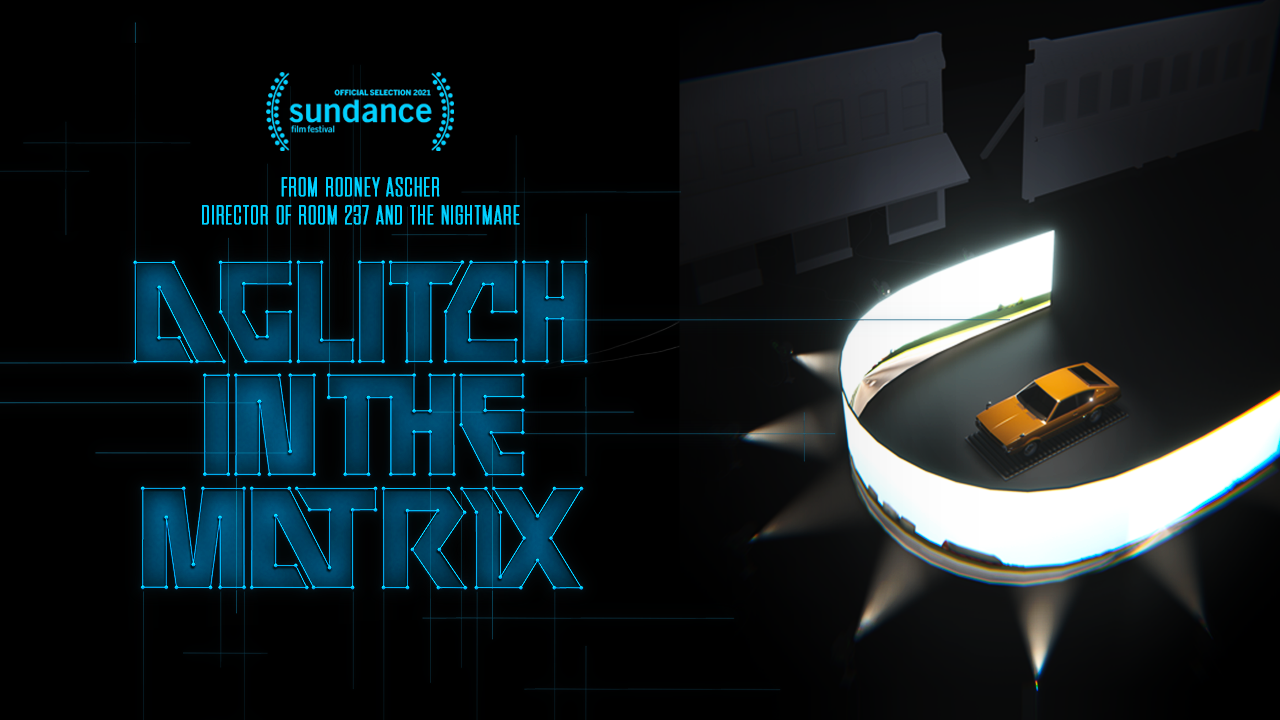Sundance 2021 Review: Rodney Ascher's Hybrid Doc A GLITCH IN THE MATRIX Simulates Belief
Rodney Ascher nose-dives into the rabbit hole of simulation theory argument in a cyber-acid documentary.
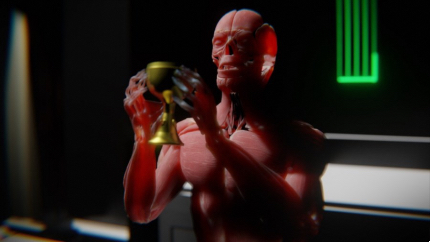
"It is sometimes an appropriate response to reality to go insane."
Philip K. Dick
Sundance regular Rodney Ascher returns on the festival turf (virtually) with his The Nightmare (2015) follow-up, A Glitch in the Matrix. The title of Ascher´s newest documentary refers to a popular phrase usually reserved for déjà vu. The phrase has been widely popularized by Wachowski's era-defining film The Matrix in 1999.
Similarly to Ascher's 2012 documentary Room 237 that ponders strange theories and arcane interpretations of Kubrick's take on The Shining, The Matrix becomes frequently referenced material in his latest documentary.
A Glitch in the Matrix dives into the simulation theory (or the simulation hypothesis) that gained traction in academia, popular culture, and across mainstream media. The theory is rich and varied and extends far beyond the simple statement that "we are living in a simulation" and offers mind-warping food for thought.
While Ascher does not have the ambition to penetrate the obscure layers of the simulation theory in-depth, he captures the breadth of its implications spanning across popular culture, philosophy, religion, and psychology.
Curiously enough, A Glitch in the Matrix does not kick off with The Matrix nod but takes a more oddball albeit thoughtful detour. At the beginning of the Ascher´s documentary is the famous 1977 "Metz speech" by the visionary and paranoid author Philip K. Dick. Dick took a legion of his French fans by surprise when attending a science fiction convention. He proclaimed his books are actually not works of the imagination but his real-life experiences and that this is just one world out of many.
However, Dick is nowadays considered the prophet of the information age as his paranoid ramblings transmuted into visionary prophecies. The Exegesis of Philip K. Dick offers a more first-person perspective on the author´s unique perception of reality which is also referred to in the Ascher´s film.
The short clip of Metz speech serves as a pre-emptive rebuke to disprove the relevancy of the simulation hypothesis. It is a smart dramaturgic move on the director's side heralding that the audience´s suspension of disbelief is not going to be strained that much. As the ground is prepared, Ascher drops the first interviewee (people interviewed on camera in the film are called "eyewitnesses") revealing his belief in the simulation hypothesis and the circumstances that led to this assumption.
Ascher follows the similar approach from The Nightmare of respondents retelling their somewhat baffling experiences and explaining what they think The Matrix got right. No simulation theory deniers have been asked to raise the other side of the argument. However, that decision will prove unnecessary in the long-run as Ascher does not give a platform to kooky and deranged ideas and the theory will get anchored in less sensationalistic terms compared to mainstream media coverage.
Furthermore, the testimonies by "simulation believers" uncover motivations behind the process of adopting such eccentric beliefs as their worldview. Besides, the dramaturgy of "eyewitnesses" contributes to the film´s psychological thread that lands to a gut-punch denouement doubling as the film´s actual moral and a (true crime) warning.
Ascher builds on his previous works and A Glitch in the Matrix turns out to be a formalistic cross-over between Room 237 and The Nightmare. Talking heads, voice-over, and animated reenactments of (strange) experiences follow The Nightmare formula while obsessive deciphering of The Matrix is the tool of the trade brought from Room 237. The production value however exceeds the low-budget constraints of Room 237 which is basically a barebone desktop documentary wheras A Glitch in the Matrix happens to be an augmented desktop documentary.
After all, A Glitch in the Matrix is a doc for the big screens. The talking heads segments had been upgraded in a nerdy nod to the simulation theory and Cameron´s film Avatar. Each interviewee is represented as a custom-made animated videogame styled avatar and not necessarily for the purposes of anonymity.
The animation is further employed to illustrate their ideas, incidents, and encounters that led them to dispute the ontological reality. Besides, animated scenes are further employed to portray alternative scenarios to reality contemplating reasons why mankind may be imprisoned in a simulation.
The director continues to fine-tune the brand of an eerie, and in this case speculative, cinematic edutainment that appears to become his trademark. Wedged between journalism and popculture, the provocative and thought-provoking documentary introduces respectable authorities in their field as professor Nick Bostrom, the author of the paper Are You Living In a Computer Simulation?, and more surprisingly, a boundary-pushing cartoonist Chris Ware. However, less surprisingly, the poster child of simulation theory in the mainstream, the celebrity billionaire and PR stuntman Elon Musk, happens to make a presence on several occasions albeit outsourced from publicly available clips.
Alongside the Skype calls with eyewitnesses, the majority of the film is a patchwork of animation (one disturbingly immersive) and graphics by Mindbomb Films (Jodorowsky's Dune, Heaven's Gate) made for the purposes of A Glitch in the Matrix, a host of clips either from video sharing platforms or other films and Google Earth. The director attuned the film´s style and approach to the motif of a mediated and virtual reality while the form of communication frequently memeficaton.
As Room 237 became gradually more about the semiotics of image and narrative than conspiracy theories Kubrick supposedly encoded into the film, the simulation theory in A Glitch in the Matrix acts as a concept on the intersection of two topics prevalent to current times - the impact of technological development on our understanding of the world and the mystery of human consciousness.
The development of technology heavily influences the direction of civilization and has a great impact on every possible sphere from social to language. The history of mankind is a history of technology and the current acceleration in the development of new-tech opens discussion about subjects considered before unthinkable (cue Philip K. Dick) and gives rise to new movements and philosophies such as transhumanism.
Technology can play a strong role also in religion (cue Philip K. Dick) which is one of the smaller fibers that run through A Glitch in the Matrix. More importantly, the current powerful influence of emerging tech, AI, machine learning, and the upcoming revolution with quantum computing is rewiring the way reality and the world is being formed and molded. And that is fodder for a plethora of underground prophecies and somber visions of the next stage of human (r)evolution.
Yet as the film does not fail to reiterate, the concept of our limited perception of reality and impossibility to truly experience objective reality is not a fresh discovery. The understanding that mankind is sentenced to not know the actual objective reality interweave throughout the history from Plato´s notorious parable of the cave or Cartesian notion of René Descartes both of which are acknowledged in the Ascher´s film.
They both point towards the dualism of mind (and consciousness imprisoned within) and outside reality and the impossibility to understand the objective reality from within our subjective minds which creates a fertile ground for ruminations on the intersection of philosophy and religion which the film addresses. Ultimately, A Glitch in the Matrix thematizes mankind´s timeless and Sisyphean struggle to fully comprehend consciousness, world, and reality surrounding it.
However, Glitch in the Matrix is not heavy on these theories as Ascher keeps them in the background as aftereffects of animated docu-narrative cyberpunk creepypastas disclosed by "eyewitnesses". The director translates the interpretations ("experiences") of simulation theory into a reflective entertainment of a speculative hybrid doc whote theme extends from the initial subject matter to envelope human condition.
After all, according to some neuroscientists, our brains are engines that hallucinate conscious reality for us.
A Glitch in the Matrix will be released virtually on February 5, 2021.
A Glitch in the Matrix
Director(s)
- Rodney Ascher
Cast
- Nick Bostrom
- Joshua Cooke
- Erik Davis
- Paul Gude




